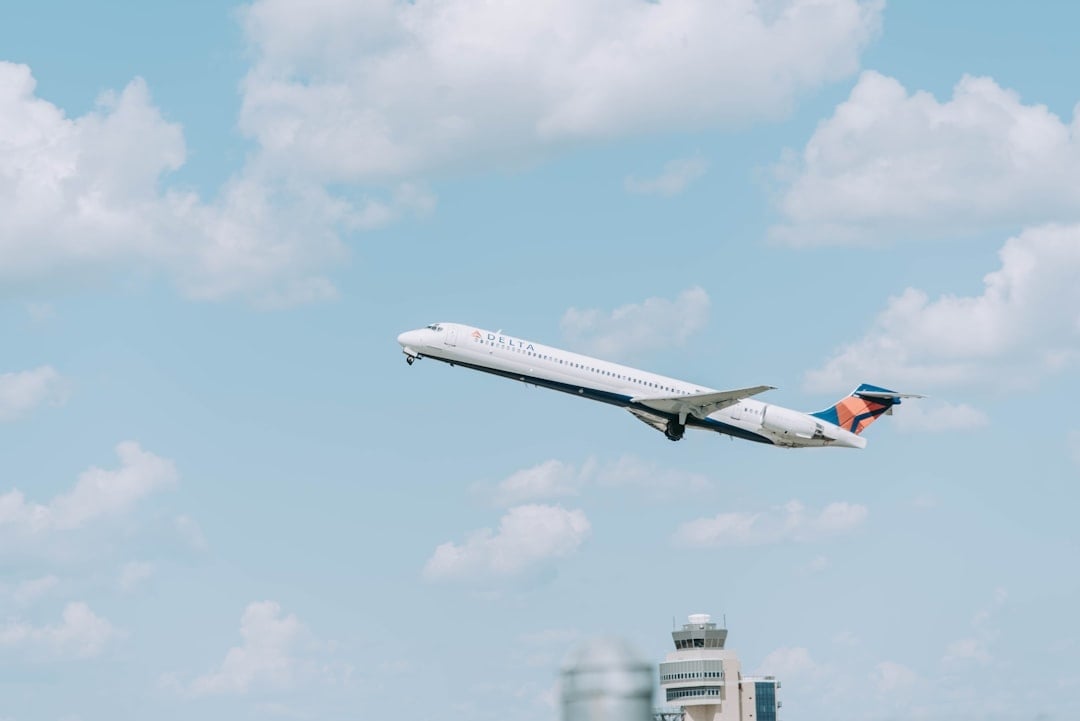Key Takeaways
• Delta Flight 127 made emergency landing in Azores on July 6, 2025, due to Pratt & Whitney PW4000 engine failure.
• All 282 passengers and 13 crew safely evacuated; crew flew 1.5 hours on one engine to Lajes Airport.
• Delta provided hotel stays, meals, and a rescue Airbus A330; passengers waited 29 hours before continuing journey.
Delta Air Lines Flight 127, traveling from Madrid to New York on July 6, 2025, made an emergency landing in the Azores after a serious engine problem. The quick actions of the crew and the safe landing at Lajes Airport on Terceira Island kept all 282 passengers and 13 crew members safe. This event highlights both the challenges of long-distance flights and the importance of strong safety procedures in aviation today.
Emergency Unfolds Over the Atlantic

About an hour and a half after leaving Madrid, passengers on Delta Air Lines Flight 127 heard a strange “whizzing” noise and noticed a burning smell in the cabin. The flight crew quickly realized there was a mechanical issue with one of the plane’s two Pratt & Whitney PW4000 engines. These engines are known for powering many large aircraft, but like all machines, they can develop problems over time.
The pilots acted fast. They declared a ‘Mayday’—the international signal for a life-threatening emergency—and spoke with air traffic controllers. Their training and experience guided them as they decided to divert the plane to the nearest safe airport, which was Lajes Airport on Terceira Island in the Azores 🇵🇹. This group of islands, located in the middle of the Atlantic Ocean, has long served as a safe haven for planes in trouble during transatlantic flights.
Safe Landing and Immediate Response
At 3:55 p.m. local time, the Airbus A330-300 touched down safely at Lajes Airport. The pilots had flown the plane for about 1.5 hours with only one working engine. This is a difficult task, but modern planes like the A330 are built to handle such situations. All passengers and crew left the plane using stairs, and no one was hurt.
Delta Air Lines quickly took steps to care for everyone on board. Since Terceira is a small island with a population of about 54,000, resources were limited. Still, Delta arranged for overnight hotel stays and meals for all passengers and crew. The airline also sent a replacement Airbus A330 from New York to pick up the stranded travelers.
Delays and Passenger Experience
Because of rules that require pilots and crew to rest after long flights, the rescue plane could not leave right away. This meant passengers had to wait about 29 hours before they could continue their journey. The rescue flight finally left Terceira at 9 p.m. on Monday, July 7, and arrived in New York later that night.
Passengers described feeling anxious during the flight, especially after hearing strange noises and smelling something burning. However, many also said they were grateful for the safe landing and the care they received afterward. One passenger told local news, “It was scary, but the crew kept us calm and Delta did their best to help us once we landed.”
Delta’s Official Response and Ongoing Actions
Delta Air Lines released a statement soon after the incident, saying, “Safety comes before all else.” The airline confirmed that the crew followed all emergency procedures and apologized for the disruption. Delta is now contacting affected passengers directly to offer compensation for the delay and inconvenience, though the exact details of this compensation have not been made public.
Delta also sent maintenance teams and engineers to Lajes Airport to inspect and repair the grounded Airbus A330. As of July 10, 2025, the plane remains in the Azores, waiting for repairs and a full safety check before it can return to service.
Industry and Regulatory Context
This emergency landing comes at a time when airline safety is under close watch. By mid-February 2025, at least four major aviation incidents had been reported worldwide. U.S. Transportation Secretary Sean Duffy responded to public concerns by saying that air travel remains very safe, pointing to ongoing investments in air traffic control and safety systems.
Aviation experts have praised Delta’s response to the emergency. They note that the airline’s quick actions and focus on passenger care helped prevent injuries and kept the situation under control. However, they also warn that such high-profile incidents can hurt an airline’s reputation, especially if passengers feel their needs are not met.
How the Diversion Process Works
When a plane has a serious problem over the ocean, the crew must make quick decisions. Here’s what happened on Delta Flight 127:
- Detection of Engine Issue: The crew noticed abnormal readings from the Pratt & Whitney PW4000 engine and heard strange noises.
- Declaration of Emergency: The pilots declared a ‘Mayday’ and told air traffic controllers about the problem.
- Diversion to Lajes: The plane changed course and headed for Lajes Airport, flying on one engine for about 1.5 hours.
- Safe Landing: The pilots landed the plane safely, and everyone got off without injury.
- Passenger Care: Delta arranged hotels and meals for everyone while they waited for a rescue flight.
- Rescue Flight Logistics: A replacement plane and crew were sent from New York, but had to wait for required rest periods before flying.
- Ongoing Maintenance: Delta’s engineers are still working on the damaged plane in the Azores.
Passenger and Expert Perspectives
Passengers on Flight 127 experienced a range of emotions. Many felt scared during the flight, especially when they realized something was wrong with the engine. The burning smell and strange noises added to their worry. However, after landing safely, most passengers expressed relief and thanked the crew for their professionalism.
Aviation analysts say Delta’s handling of the situation was strong. “The crew followed all the right steps, and Delta’s quick response with hotels and a rescue flight shows they put passenger safety first,” said one industry expert. Still, they point out that such incidents can be tough for airlines, as delays and diversions can lead to extra costs and unhappy customers.
Impact on Delta Air Lines and the Aviation Industry
This incident has several effects on Delta Air Lines and the wider aviation industry:
- Operational Challenges: Delta had to quickly find hotels and meals for nearly 300 people on a small island, which is not easy. They also had to send a replacement plane and crew from New York, adding to costs and delays.
- Reputation: While Delta’s response was praised, repeated incidents like this can make passengers nervous about flying. Airlines must work hard to keep public trust.
- Safety Reviews: The problem with the Pratt & Whitney PW4000 engine may lead Delta and other airlines to review their maintenance and inspection procedures, especially for older planes.
- Customer Relations: How Delta handles compensation and communication with passengers will be watched closely by the industry. Good crisis management can help rebuild trust after an emergency.
Why the Azores Matter in Aviation
Lajes Airport on Terceira Island is a key location for emergency landings during transatlantic flights. Its mid-Atlantic position makes it a safe option for planes that run into trouble far from the mainland. The airport is used by both military and civilian flights and has a long history of helping planes in distress.
Delta’s Safety Record and Commitment
Delta Air Lines has a strong reputation for safety. The airline follows strict procedures for emergencies and puts passenger care at the center of its response. As reported by VisaVerge.com, Delta’s actions during this incident show the importance of training, quick thinking, and clear communication in keeping passengers safe.
What Passengers Should Do After an Incident
If you are ever involved in a flight diversion or emergency landing, here are some steps to take:
- Stay Calm: Listen to the crew and follow their instructions.
- Ask Questions: If you are unsure about what is happening, ask the crew for information.
- Keep Records: Save any documents or emails from the airline about the incident and your delay.
- Contact the Airline: Reach out to customer service for updates and to ask about compensation. Delta Air Lines provides information and support through their official website.
- Know Your Rights: In many cases, airlines must provide meals, hotels, and sometimes compensation for long delays or diversions.
Looking Ahead: What Happens Next?
The damaged Airbus A330 remains in the Azores as Delta’s engineers work to fix the Pratt & Whitney PW4000 engine. The plane will only return to service after passing all safety checks. This incident may lead Delta and other airlines to look more closely at engine reliability and maintenance schedules.
Regulators and industry leaders will also review the event to see if any changes are needed in safety rules or emergency procedures. U.S. Transportation Secretary Sean Duffy has promised continued investment in air traffic control and safety systems to keep air travel as safe as possible.
For Affected Communities and Families
For the people of Terceira Island, the arrival of nearly 300 unexpected guests was a challenge. Local hotels and restaurants worked with Delta to provide shelter and meals. Such events can put a strain on small communities, but they also show the importance of global cooperation in times of need.
Families of passengers waited anxiously for news but were relieved to learn that everyone was safe. Delta’s communication with families and the public helped ease concerns and showed the value of clear, honest updates during a crisis.
Summary Table: Key Facts
| Detail | Information |
|---|---|
| Date of Incident | July 6, 2025 |
| Flight Number | Delta 127 (DL-127) |
| Aircraft | Airbus A330-300 (N805NW) |
| Route | Madrid (MAD) → New York (JFK) |
| Passengers/Crew | 282 passengers, 13 crew |
| Diversion Location | Lajes Airport, Terceira, Azores |
| Cause | Engine failure (Pratt & Whitney PW4000) |
| Time on Island | ~29 hours |
| Rescue Flight Departure | 9 p.m. Monday, July 7, 2025 |
| Compensation | Offered by Delta (details not public) |
| Aircraft Status | Under repair in Azores as of July 10, 2025 |
Official Resources and Further Information
For those seeking more details or needing assistance, Delta Air Lines offers updates and support through their customer service page. For regulatory and safety information, the U.S. Department of Transportation provides resources on passenger rights and airline responsibilities.
Conclusion and Practical Takeaways
The emergency diversion of Delta Air Lines Flight 127 to the Azores shows the importance of strong safety systems, well-trained crews, and clear communication in aviation. While the incident caused delays and stress for passengers, the safe outcome and Delta’s response offer reassurance to travelers everywhere.
If you ever face a similar situation, remember to stay calm, follow crew instructions, and keep in touch with the airline for updates and support. Airlines like Delta continue to invest in safety and customer care, helping to make air travel as safe and reliable as possible—even when unexpected problems arise.
Learn Today
Emergency Landing → A sudden landing made due to a critical issue threatening flight safety, requiring immediate action.
Pratt & Whitney PW4000 → A large turbofan engine model used on many wide-body aircraft, including the Airbus A330.
Mayday → An international radio distress signal declaring a life-threatening emergency on board an aircraft.
Lajes Airport → An airport on Terceira Island in the Azores, often used for emergency landings on transatlantic flights.
Rescue Flight → A flight dispatched to retrieve stranded passengers and continue their journey after an emergency diversion.
This Article in a Nutshell
Delta Flight 127 suffered engine trouble over the Atlantic on July 6, 2025 and safely landed in the Azores. The crew’s swift response saved 295 lives, highlighting aviation safety and crisis management during long-haul flights amidst increasing airline industry scrutiny.
— By VisaVerge.com













